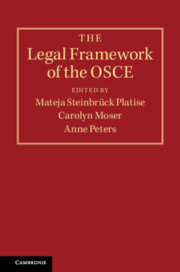Book contents
- The Legal Framework of the OSCE
- The Legal Framework of the OSCE
- Copyright page
- Contents
- Contributors
- Preface
- Abbreviations
- Part I Introduction
- Part II The Quest for International Legal Personality
- Part III Manifestations of the Legal Position under International Law
- 7 Revisiting Questions of Organisationhood, Legal Personality and Membership in the OSCE: the Interplay Between Law, Politics and Practice
- 8 The OSCE’s Domestic Legal Status: an Exploration of Relevant International Law Sources
- 9 Privileges and Immunities of the OSCE
- 10 The External Relations of the OSCE
- 11 The International Legal Responsibility of the OSCE
- Part IV The Legal and Institutional Framework as a Governance Issue
- Part V Conclusions
- Index
- References
10 - The External Relations of the OSCE
from Part III - Manifestations of the Legal Position under International Law
Published online by Cambridge University Press: 15 August 2019
- The Legal Framework of the OSCE
- The Legal Framework of the OSCE
- Copyright page
- Contents
- Contributors
- Preface
- Abbreviations
- Part I Introduction
- Part II The Quest for International Legal Personality
- Part III Manifestations of the Legal Position under International Law
- 7 Revisiting Questions of Organisationhood, Legal Personality and Membership in the OSCE: the Interplay Between Law, Politics and Practice
- 8 The OSCE’s Domestic Legal Status: an Exploration of Relevant International Law Sources
- 9 Privileges and Immunities of the OSCE
- 10 The External Relations of the OSCE
- 11 The International Legal Responsibility of the OSCE
- Part IV The Legal and Institutional Framework as a Governance Issue
- Part V Conclusions
- Index
- References
- Type
- Chapter
- Information
- The Legal Framework of the OSCE , pp. 199 - 214Publisher: Cambridge University PressPrint publication year: 2019

